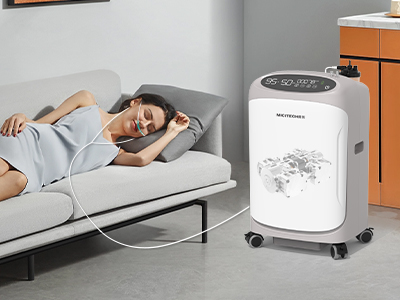07 Sep 2024
Oxygen air compressors have long been a crucial component in various sectors, from healthcare to industrial manufacturing. With the increasing demand for reliable and efficient oxygen supply, the need for advanced oxygen air compressors has grown exponentially. Technological advancements in this field are revolutionizing how compressors are built and used, ensuring that they not only meet current demands but also exceed expectations in efficiency, safety, and versatility.

Smart Control Systems
One of the most groundbreaking advancements in oxygen air compressor technology is the integration of smart control systems. Artificial Intelligence (AI) and the Internet of Things (IoT) have revolutionized how compressors function, allowing for more efficient monitoring and control. These smart systems can remotely monitor the compressor’s performance, instantly detecting issues like pressure drops or temperature spikes. Automated systems ensure that the compressor operates at optimal efficiency, minimizing energy use and reducing the need for human intervention. By predicting maintenance needs through real-time data analysis, smart control systems help in avoiding costly downtime and extending the machine’s lifespan.
Energy Efficiency Innovations
The push for greater energy efficiency has led to the development of compressors that consume significantly less power while maintaining high levels of performance. With the rising costs of energy and the need to reduce carbon emissions, manufacturers are focusing on creating compressors that are not only efficient but also eco-friendly. These energy-saving designs reduce operational costs for businesses and lessen the environmental impact, a critical aspect for companies looking to improve their sustainability efforts. Advanced compressors with variable speed drives, for example, allow for energy consumption to be adjusted based on demand, ensuring minimal wastage and maximum efficiency.

Compact and Portable Models
The demand for oxygen compressors is no longer confined to large-scale industrial use. Compact and portable oxygen air compressors are increasingly in demand, especially in the healthcare sector, where mobility and space-saving designs are vital. Recent technological advancements have allowed for the production of smaller, lightweight compressors without compromising on power or output. These portable models are especially beneficial for home healthcare, emergency medical services, and mobile clinics, where immediate and flexible oxygen supply is crucial.
Noise Reduction Technologies
One common drawback of traditional oxygen air compressors has been the level of noise they produce. This issue is particularly problematic in environments such as hospitals, where noise can disrupt patient care. Fortunately, recent developments have focused on significantly reducing the noise output of compressors. With the advent of new materials and soundproofing techniques, manufacturers have introduced models that operate much more quietly, ensuring a less disruptive work environment. Noise reduction is not only important in healthcare but also in industries where reducing noise pollution can lead to better working conditions and higher productivity.
Enhanced Safety Features
With safety being a top priority in any equipment that deals with oxygen, modern oxygen air compressors are now equipped with more advanced safety features. New safety mechanisms, such as automatic shut-offs in the event of a system malfunction, ensure that compressors do not pose any danger during operation. In addition, manufacturers are now using more robust materials to build compressors, increasing their durability and resistance to extreme conditions. These safety features are particularly crucial in high-risk environments like hospitals and chemical plants, where oxygen compressors are often in constant use and require the highest safety standards.
Improved Air Purification Systems
For oxygen air compressors used in medical and industrial applications, air purity is critical. The latest innovations in air purification systems have led to compressors that produce oxygen of even higher purity levels. By integrating advanced filtration technologies, modern compressors can remove a higher percentage of contaminants from the air, ensuring that the oxygen produced is clean and safe for use. In the long term, these improved air purification systems lead to fewer maintenance issues, as cleaner air reduces the strain on the internal components of the compressor.
Customization and Scalability
One of the most exciting developments in the compressor industry is the rise of customizable and scalable solutions. Today’s compressors can be tailored to meet the specific needs of different industries, whether it's a small healthcare facility or a large-scale industrial operation. Scalable designs mean that businesses can increase or decrease their compressor capacity based on current demand, without the need for a complete system overhaul. This flexibility not only allows for more efficient operations but also helps companies manage costs more effectively.
Green Technology Integration
As environmental consciousness continues to grow, the incorporation of green technology into oxygen air compressors has become a major trend. Many manufacturers are now using eco-friendly materials and production methods to reduce the environmental impact of their compressors. Additionally, some compressors are designed to run on renewable energy sources, further minimizing their carbon footprint. This shift toward sustainable designs reflects a broader industry move towards responsible manufacturing and operation, catering to businesses that prioritize environmental sustainability.
Conclusion
The advancements in oxygen air compressor technology are reshaping the industry, offering enhanced efficiency, safety, and versatility. From smart control systems and energy-saving innovations to compact designs and improved air purification, these developments are setting new standards for compressor performance. As the demand for oxygen air compressors continues to grow, we can expect further innovations that will continue to push the boundaries of what these machines can achieve, ultimately providing more reliable, efficient, and sustainable solutions for a wide range of applications.
Keywords: air compressor
Originally published 07 Sep 2024, updated 07 Sep 2024.